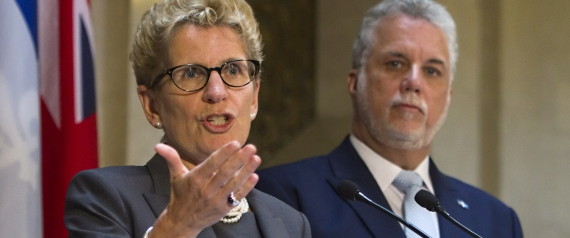The spectacle of Alberta Premier Jim Prentice having to meet with Quebec Premier Philippe Couillard and Ontario Premier Kathleen Wynne this week to discuss their “conditions” on the Energy East pipeline reversal is a sad and shameful state of affairs. These premiers have no constitutional basis to be making conditions, demands or anything else on this pipeline, and they play a dangerous game in attempting to do so.
The constitutional position is remarkably clear. The text of Canada’s Constitution specifically puts interprovincial transportation in the exclusive jurisdiction of the federal government. A long line of cases recognize that interprovincial pipelines are a mode of transportation. The case law has also long been clear that provinces cannot exercise their jurisdiction in ways that interfere with interprovincial transportation.
The Supreme Court of Canada established a definitive position in 1954 in a case called Campbell-Bennett v. Comstock Midwestern. It ruled that provinces could not interfere with interprovincial pipelines. Even though provinces could normally create legal mechanisms like liens for the enforcement of debts, the court held, they could not create mechanics’ liens that would apply to pipelines. Provincial laws could not be permitted to even risk interfering with interprovincial transportation infrastructure.
In other interprovincial transportation contexts, there have been other definitive rulings that provinces cannot interfere and even that provinces must make provincial Crown land available for federally approved projects. Such statements have been repeated over the decades. They are implicit in the recent determination of the National Energy Board that the City of Burnaby cannot take steps at a municipal level to interfere with the Kinder Morgan pipeline.
These constitutional principles were the bases on which Canada was built. Had every province felt free to interfere with every interprovincial transportation project at will – or even to threaten it under the guise of unconstitutional “conditions” – there very possibly would have been no national railways and no Canada to speak of.
Part of being part of a federation is that there is an acceptance of the definitive role of the national government making decisions on major matters of the national transportation network – in this case, through the careful analysis of the National Energy Board, which functions as an administrative tribunal independent of political influence. Every element of the national transportation network will create some inconvenience in somebody’s backyard, but the building of a country cannot be held hostage to the not-in-my-backyard syndrome that so quickly arises in any discussion.
Ontario and Quebec long benefited from the national railways in the context of a national federation. Today, Alberta and Saskatchewan need to be able to transport their oil to market, and it is shameful if provinces that long benefited from the very same principles now act on some pretense as if they did not exist.
Indeed, provinces that want their own provincial jurisdiction respected play a very dangerous game if they do not respect well-established principles of the constitutional division of powers. If Quebec is not willing to respect the clear jurisdiction of the federal government, why should the federal government respect tomorrow the clear provincial jurisdiction of Quebec? Quebec would have agreed through its own actions to throw away the rule book. If Ontario is not willing to respect clear principles of the Constitution, why should the Alberta government respect the equalization principles in the Constitution that now help prop up the budget of have-not Ontario?
The federation is a tightly woven fabric, and tugging away at one string risks unravelling the whole. Those who think that a pipeline across Canada should be subject to the same kind of interference as U.S. President Barack Obama imposes on Canadian transportation effectively treat Alberta as if it were a foreign country. That is a very dangerous game.
Within our Canadian federation, it is time for provinces to stop treating other provinces as if they were foreigners. It is time to allow the construction of national infrastructure based on federal approval when it falls within areas of clear federal jurisdiction and for the federal government to announce that its legal framework will not be subject to the vagaries of provincial kibitzing. Any other approach damages the federation and compromises our shared future. Simply put, it hurts Canada.
Dwight Newman is a senior fellow of the Macdonald-Laurier Institute and the author of Natural Resource Jurisdiction in Canada.
Provinces have no right to pipeline «conditions»






















Laissez un commentaire Votre adresse courriel ne sera pas publiée.
Veuillez vous connecter afin de laisser un commentaire.
Aucun commentaire trouvé